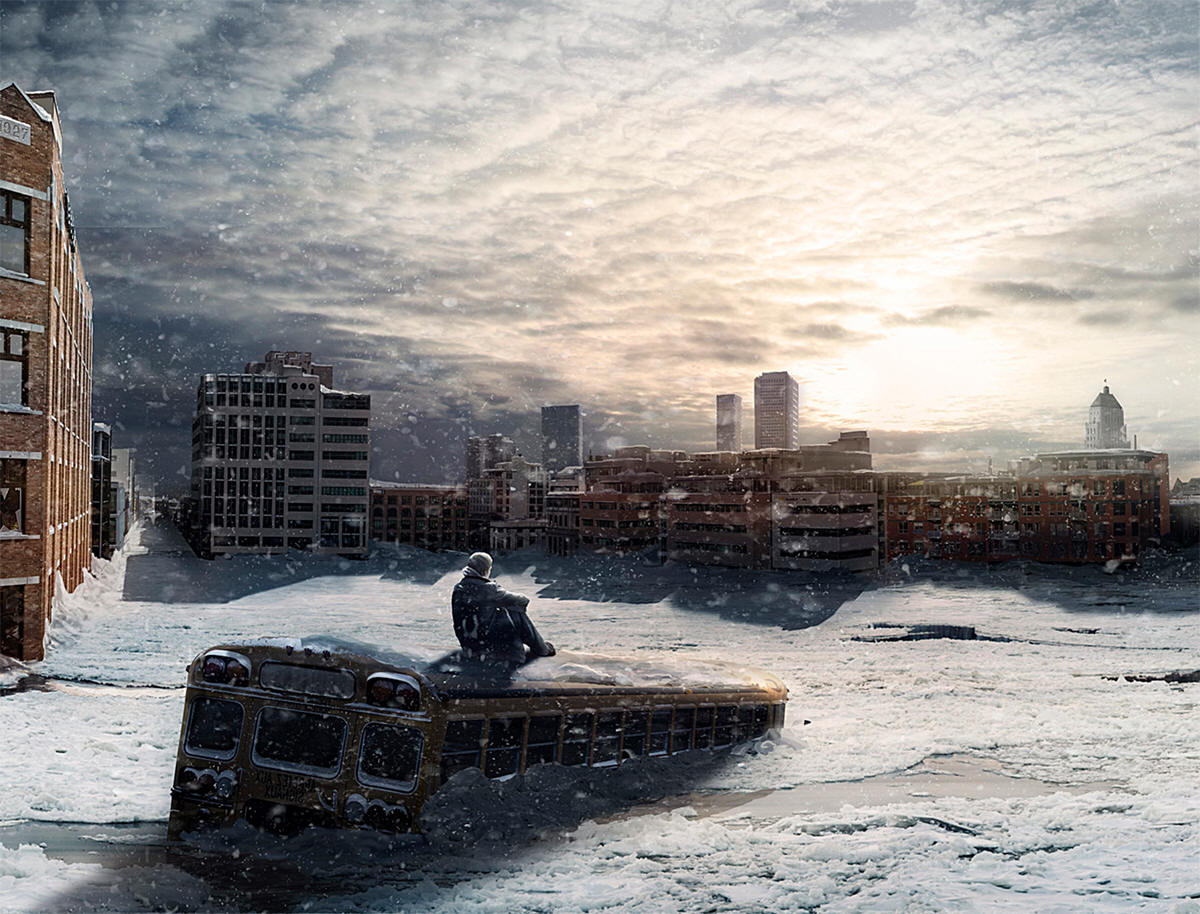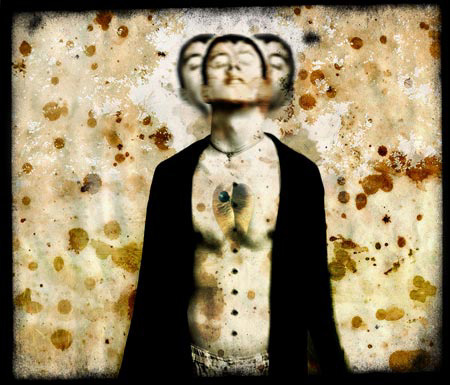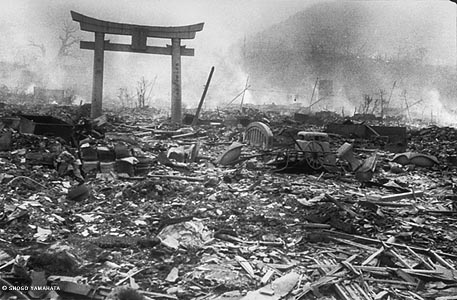8 Pieces of a Person by Amy Crosby

8 Pieces of a Person
by Amy Crosby
It was the end of the world and he had five things to his name. They were as follows: a set of keys to a building that no longer existed, a dog-eared postcard framing a beach that no longer existed, a rusty penknife to defend himself with, a wrapper from an empty packet of Softmints and a brain full of memories.
He knew that the first two places no longer existed because he had visited them. The ground floor flat that he used to live in was now a shrunken, blackened shell. He had hauled the splintered door aside and frightened the only two birds that he had seen for a month. In a panic, they clapped their way through the window frame, spread wide, and left him to finger through their faeces and the crumbs of his belongings. That was where he had found his father’s penknife, stout amongst the ashes. Remembered how his father cut apples, sliding the blade towards his thumb and never once drew blood. He took it and hoped he wouldn’t have to either.
The second place, the beach, had become a graveyard for cars that people had driven to the sand, hoping that there would be a ferry. There was no ferry. They wailed and succumbed to their knees in the surf, wondering why the jade-coloured water that had once brought them fish and riches had forsaken them. It looked nothing like the postcard now: sharp ribbons of the pier stuck out from the sea like Poseidon’s teeth and so, in essence, neither place existed as he once knew them.
The last thing he had to his name, his memories, were focused on one person in particular and he hoped that she still existed.
With his belongings, he walked.
He had travelled more, pursued by death, than he had ever done in the name of living. Everywhere he went, colonies of people huddled, reminding him of penguins on shrinking ice floes, balancing supplies and ideas of self-sufficiency between their feet. Global warming, what a joke. Those ridiculous naturalists, ecologists, with their shabby suits and frogspawn, cluttering up the ten o’clock news. Where were their grandiose statements now? People died cold. Their own countries killed them with the same winters that they’d known as children. It was only now that there were no gloves, no scarves for building snowmen, no heaters to warm their toes; they’d been stolen by someone else, just like all the cars had been stolen, the working ones at least, the ones not choked with sand. He only had his feet.
***
Memory #1 – She drove cars like she was installed behind the wheel of a dodgem cart. Her skinny spine never touched the seat; she hunched forwards, elbows bent at the steering wheel, bare knees tucked up under her chin. The driver’s window was perpetually down, panting air and, when she turned a corner, hands racing to catch up with the spinning rubber, her long hair rippled out across her face.
***
You could outrun an estate boy on a moped that was running out of gas. You could outrun teenagers with baseball bats if their testosterone was wallowing in its pre-pubescent phase. You could not outrun a car.
After he returned to England, the scudding motion of the helicopter making him bend double and vomit on his shoes, he had had to outrun the first two things many times. Tower blocks were a hive of black vibrato voices and crafted shrapnel that stung if they swarmed close enough to prick you with it. With sweat in his eyes, sometimes they caught him. The big ones, the broad ones. Didn’t matter how many times he’d emptied his pockets, promising nothing of value, they still circled him, buzzing.
That was when he had lost the sixth thing that he owned: a photograph of his mother and older brother, standing in the hallway, caught unawares by the flash. Scrunched, he held it out in his hand so that they could see that it was nothing. The wind stole it. Even before he started running.
The idea of chaos and lawlessness scared him. He had built his life on order but everyone was a thief now. Everyone except him. He had tried to steal a chocolate bar once when he was sixteen and his hand, so sweaty with guilt and fear, had melted it.
***
Memory #2 – ‘I… We’re doing this. I can’t believe we’re doing this.’
‘We’re doing this. Don’t look so guilty dumb-ass. If you look guilty, they’ll see it straight away. Practise for me.’
‘Practise what?’
‘Your not guilty face. Come on.’
He tried. She laughed at him. He didn’t mind when she laughed at him.
‘That was my nonchalant face.’ He explained.
‘Was it? It looked more like you were trying to shit… Jesus. It’s just one bar of chocolate.’
***
Nothing really belonged to anyone anymore. Whenever he stepped tentatively into supermarkets to search for provisions, he found his lips shuffling around an apology on the way out, his arms clutching onto an open can of soup or the last bag of frozen peas that had been rammed between the freezer cabinets during a previous scuffle. It took a while to dawn on him that that was the only time he spoke now.
After he ate, he washed. He took off his clothes, shy to be naked even when the world was quiet, and held them in a folded bundle at his chest, wading into cold streams in the woods and rare paddling pools that were still inflated from last summer and full of rainwater. Closing his eyes, even for a second while he was standing knee-deep was the most peaceful moment of his here and now. He paddled into the quiet of darkness and breathed the damp vapours of the air, thinking everything and nothing all at the same time. Then he dressed. He put his clothes on in a hurry, embarrassed by his pasty skin. More time could be afforded for combing his dark hair through with his fingers and trying to cut the stubble that grew insistently on his cheeks, telling him that he was a man now.
There were two spheres of worlds. The world that he was forced to share with everyone else, yes, that was the chaos and the trails of red in the stairwells and then there was his own world. That could be as structured and as ordered as he made it.
***
Memory #3 – Her defiant hair was the colour of holly leaves after they had fallen to the ground and dried there for several days in the sun. It was impossible to tame.
***
The changes in himself were hard to miss. At first, his thighs and calves had ached from walking day after day with very few breaks but now they were toning, evolving. He put his hands around them whenever he sat down, pressing at their firmness with pride. He’d never been a body-builder. He could never walk into a gym for fear of the whispers and sniggers that would go slithering around behind his back but, now, he was well-travelled and his legs were well-walked. ‘Son,’ His father had said, a year before he’d walked out on them. He gathered him in the kitchen and stared at the poppy bruise above his eye without the slightest hint of fear or concern. ‘Those boys will never amount to anything. They’ll never understand that life isn’t about having things handed to you on a plate… it’s about making your own way there.’
And he was. He knew where he was going. And he was making his own way there.
***
Memory #4 – She went to Italy once. A gaggle of girls came to pick her up from her driveway, laughing, tooting the horn. He knew them all by name, not that they knew his. They used to pass him in the corridors, too preoccupied with jostling their way towards the vending machines to notice him. She skipped out to the car, holdall slung over her shoulder.
‘Buon viaggio!’ The words were difficult to get his mouth around but they’d been well rehearsed. He raised a hand but his voice was swallowed by a spring-time breeze and lost to the air. She didn’t turn back.
***
His hometown was like a foreign country. The gutted department stores, the walkways of broken glass and upended paving stones, the twisted new shapes of lampposts. Nobody watched him as he trudged through the streets that he used to know; the hulking form of the concrete carpark structure, the upper windows of the cinema building were empty. He picked his way through the weeds and the brambles, afraid of stepping on snakes that were out for the midday sun.
***
Memory #5 – He sat looking at it. It looked back at him. Orange and yellow like a sunset, it was curled in on itself, pretending to be in the process of a lazy Sunday afternoon but you could never be too careful with reptiles. The milky pink of its eye was trained directly on his face, unblinking and glassy like a marble dipped in watery strawberry juice. He might have been a ‘lifesaver’ but he was still counting down the plastic-wrapped mice in the fridge, waiting for them to tell him that his days of pet-sitting were over.
***
It was nicer to imagine that the abandoned buses were simply waiting for some old lady to dish out her painstaking change, that the carcasses of buildings, torn open like pigeon breasts, were still whole but that wasn’t the truth. Hunger forced him inside one splayed ribcage, a terraced house with its door swinging in the wind and he patted down its bones for something fresh, feeling guilty as he went. The echoes of people’s lives were here: the photos on the mantelpiece, the TV guide marked with the programmes they wanted to enjoy as a family. The voices… The voices. He heard voices. A humming, not of stirring bees, but a rhythmical humming, pushing at the space above his head, nudging it around into a gentle melody. A lullaby.
Inside the narrow attic room, a mother wrapped her baby in a cotton pillowcase and sung from chapped, faded lips that had probably once been beautiful. They looked how his voice felt inside of him, dry and whittled away. He could barely summon it to announce himself and, when he did, it was a paper-peeling-from-the-walls kind of greeting.
‘That’s a beautiful song.’
It died as soon as he’d said it. He’d cursed it, extinguished the moment. The baby began to wail and the woman looked at him, alarmed, clutching the bundle to her breast.
‘No- no. I don’t mean any harm.’
But the father was there and his voice was surer. And angrier.
Backed into the corner, his hand came to the penknife but no, it wasn’t the penknife he was searching for; he’d never killed anything in his life. He was looking for the flat of the card, the feeling of the folded corner… There it was.
He’d been practising drawing her, on the sides of buildings, across the bricks of old city walls. He picked up pieces of chalk here and there and discarded them when he was done, deciding which pieces of her face weren’t quite how he remembered them. When the time came, he’d saved an old Bic biro and used the last of the ink to commit her face to the back of the postcard just like she had drawn him years ago.
***
Memory #6 – ‘You fidget a lot.’
‘I don’t.’ The truth was that he didn’t want her staring at his face too closely. He was afraid that she’d notice it, see the flaws that he saw every time he looked in the mirror.
‘You do. Quit moving; I’ve gotta get your eyes right. They’re kinda sunken in.’
‘Sunken in?’
‘Yeah, they make your nose stand out more…’
Shame welled up inside of him and threatened to spill over.
‘You have an awesome face to draw.’ She added, unintentionally saving him. ‘It’s really interesting.’
He felt sure that his urge to smile was going to destroy the hard pen line of his mouth. He jostled his knee to keep it from the paper.
***
‘Please.’ The words hurt his throat as they came out, unpractised. He’d wanted to say it for months but there had been no one to say it to. ‘I’m looking for this girl. I know she’s around here.’
‘Get out.’
‘Please. Have you seen her?’
‘It’s not even a photo.’
The mother spoke: ‘What colour is her hair?’
He wanted to describe it in all of its facets, the way it was in the sun and in the autumn and under artificial lights. He wanted to talk of holly leaves but he held himself back.
‘Brown. Light brown.’
‘And her eyes?’
‘Blue.’
‘Is she yours?’ The father.
‘… Yes.’ Yes, he so desperately wanted her to be his. He always had.
‘I’ve seen her.’ The mother said. ‘On the farmland with blood round her mouth.’ And then a pause. A nasty pause. ‘She kills the dogs. The strays that go down there looking for food.’
‘Thank you.’ He backed out of the door. It was all he could say. ‘Thank you.’ The words too rounded and clipped. They were strangers afterall. He could say no more.
***
Memory #7 – She always went back to the same place: the barn where they found her father swinging from the support beam, his shiny shoes too high to stir the hay that littered the floor. The wind had a habit of curling it in circles and she was there when they cut him down, sifting the patterns with her feet.
It didn’t matter that they’d sold the farm when her mother remarried. It didn’t matter that the barn didn’t belong to her anymore. She’d always existed in a world where nothing belonged to anyone and everything belonged to her. She always went back. She went back when she wanted to cry. He found her there.
***
He found her there. The farmhouse was empty. He curved round to the back where the small sections of fields chased each other over the hill and the barn stood, shining corrugated metal beside the grain silo. The roof was caved in in places as if a child had taken a thumbtack and punctured it with fetid holes. It had always been like that. Here, nothing had changed.
***
Memory #8 – The tears stood out against her cheeks, sparkling. He read anger in her face immediately; she didn’t like other people to see her cry. She resented the fact that he’d found her, that he always knew where she’d be. Her knees came up under her chin and one hand was poised on the ladder, threatening to push it from the shelf and cut off his route.
‘What?!’ She demanded, indicating that the intrusion was forgiven. He climbed up and sat, the silent listener, beside her. ‘Sometimes other people’s garbage gets inside my head and then it spills out of my eyes.’
It was the wisest thing he’d ever heard her say.
***
He climbed the ladder.
An imprint of the girl he remembered was cut out and tacked in the corner, as flimsy as paper, half slid onto the wooden boards, half propped up against the cobwebs on the wall. At first, he questioned if she was real or if he was simply remembering her likeness from the day that he’d sat beside her and listened to the tirade of things that made her sad. Something shone on her, white and glistening. The tears? No. It was on her legs, the streaks of someone else’s release. Her dress was torn.
It wasn’t the girl he remembered. Someone had come along and smudged her with a great heavy thumbprint, squashed her against the corner like an unwanted spider. He stared at the pools of her eyes, trying to fall into them and find something at the bottom but they were vacant. They gazed into space, unseeing, unblinking. Unnoticed, a slither of spittle rolled from the side of her mouth and onto her chin, permeated by droplets of dirty, dark red, like the rust on the roof. The end of the world had not been kind to her.
‘Hey,’ He said, the greeting he’d been saving just for her. ‘It’s me. Do you remember me?’
But there was nothing. A long, slow nothing.
He scrambled close enough to tap the edge of her shoe. A brief tap. A you-can-stop-pretending-now tap. The game is over. I found you. Amongst the rubble and the battered, hopeless people, I found you.
She tried to claw at him, tried to get at his eyes, no longer a person, just an extension of the animals that her mouth had torn apart but he managed to hold her arms, crossed them over her body and tucked her against him and the solidity of his steadfastness. It occurred to him then: this was the first time that he’d held her. The first time. He rocked her like a child and kissed her on the top of her prickly hair.
‘Ssh-ssh. Everything’s fine. You remember me.’
He probed his aching brain for one last favour: a song, one of the songs she liked, the babble of noise, any one of them, and he began, not sure if the tune was the same anymore, not sure how muddled by time his memories had become.
He reached back into his pocket and found the flat of the postcard, the dog-eared corner. No, it wasn’t the card he was looking for, his fingers searched on and there it was, sticking there like a thorn. Pulled it out. Because he loves her… Because he loved her. He snapped it open.
The girl quivered there in a tangle of arms and the boy held her fast, letting her love spill over from her throat and into his waiting hands.
* * * * THE END * * * *
Copyright Amy Crosby 2016



